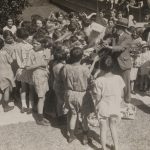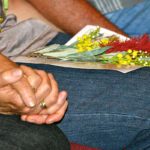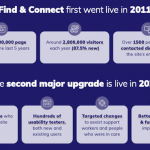Records - files or the fabric of life?
- Jun 28, 2019
- In Features
This substance of this post was provided by Greg Baker, reproduced by permission, from a talk he gave about the impact accessing records can have on Care Leavers. All words (below the introductory paragraphs) are his
To obtain a Records Access Documentation grant, organisations must demonstrate how they will improve access to records for Care Leavers – this can include making more records available (including photos, video or sound recordings) as well as surveying and indexing existing records, reducing the timeframe between requesting records and accessing them, and providing information about records on www.findandconnect.gov.au.
That records are important to Care Leavers is understood, but the importance they hold can really only be described by some-one who has been through the experience of firstly finding out that records may have been kept about their life, then discovering that those records may be missing, or don’t contain important information, and finally, if they are available, accessing the records about their lives.
Successful RAD applicants are required to attend a workshop, an important part of which this year was hearing from a Care Leaver, Greg Baker, about that journey from discovering that records were kept and may still exist, to the impact that accessing them can have on some-one’s life.

Image of records provided by Greg Baker for the 2019 RAD workshop
Greg Baker generously agreed to speak to those working on RAD-funded projects, and had a profound impact on everyone in the room. With Greg’s permission, we are sharing the following for those who may be working with records, or those trying to find them, so we can have a better understanding of what records are, and what they mean, to the people they were created about.
The following are all Greg’s words, taken from his presentation at the 2019 RADGrants workshop:
We’re always looking for a truth – what actually happened, what didn’t happen?
Photos, family stories, school reports, achievement awards and childhood friends are sadly lacking or non-existent for many care leavers. All that is left is “official” records.
These records are wide ranging, and can be of little importance, or it can be life changing.
Records are not records per se, they are the fabric of people’s past and present lives,
Their raison d’etre
The difficulty for record holders (the gatekeepers) is not knowing what is important, or if a certain phrase or sentence can change a person’s understanding to their past, and/or will begin the healing/grieving process; or worse still, record holders do understand, and withhold / destroy records, or make it difficult for the care leaver to view, to access. To share ownership is the only way forward, and the fundamental right of the care leaver.
Access to records can authenticate and give credence to the care leavers memories and experiences in care. Even if the records are lacking in detail, existence, or be counterproductive, they are important and relative to the journey.
I witnessed the release of, records 6 years ago at an “orphanage” reunion. I watched a fifty eight year old man cry uncontrollably as he realised he had two other brothers he never knew. Another found out his father’s real name for the first time.
Records have, and are still able to, change people’s lives, memories and perceptions of their world. They can also give rise to resentment, bitterness, depression and animosity. It is not the record holders to judge the veracity or relevance of any record, the consequences of those records should be dealt with after the access.
Our lives are stitched together by these records.






Ellen Bucello
June 28, 2019 8:14 pmIt would be nice to find some Fabric. My address to RAD would be to tell them how I felt when searching for my past that I don’t exist. Oops! We believe we accidentally deleted you. Trying to find out where I belong, wanting to belong, to have come from somewhere, but like the 10 foster homes over 11 years misplaced somewhere. We have not been able to find anything on you. Do I exist? Am I in another universe? I want it all to be a dream, but it isn’t. Can someone please find that child that is still lost.
Ellen Bucello
Greg
July 5, 2019 11:23 pmI’m sorry to hear this, it took me almost 50 years to glean what I have , I hope you will find your child , Greg
Merv
June 28, 2019 6:17 pmThanks Greg for making lots of important issues on a vital topic.
Many agencies keep records about us – schools, health services, banks to name a few – but they don’t always keep accurate records . Sometimes, they make judgements which cannot be justified or supported by evidence.
Childcare records are different because often the subjects of the record don’t know and are not told what’s on the record and just as important what’s not included in the record.
So to discover as an adult that vital information has been kept from you all your life can be a shattering experience provoking all sorts of emotions, especially anger and resentment as well as sadness at lost opportunities.
Records Involve lthe use of power which can be abused in the wrong hands. Records are also like a minefield if not managed with care and sensitivity.
It’s good to see grants to update them and make them more accessible. But filling in the gaps where information is missing or coping with past negative attitudes remain a big challenge.
shirley Steans
June 28, 2019 11:43 amYes Grant, I witnessed the same experience from a Home Reunion back in 2006.
The East Kew Girls Home.
It was the joy of finding siblings and hearing the sadness of loss never to have known them. The lost years can never be raised or shared, only the facts one learns from the records and the meeting up at reunions. It was the greatest reward for me, learning through my own passion and hopes of discovery that I was able to help others to reconnect with siblings they lost and never knew and to learn more about their family history.
Helen
June 28, 2019 11:24 amFor those of us who take these things for granted, it is very moving indeed to read of the ramifications such a journey can have on an individual. Thank you Greg.
Rachel
June 28, 2019 10:27 amPowerful and moving words – thanks Greg for sharing. Rachel